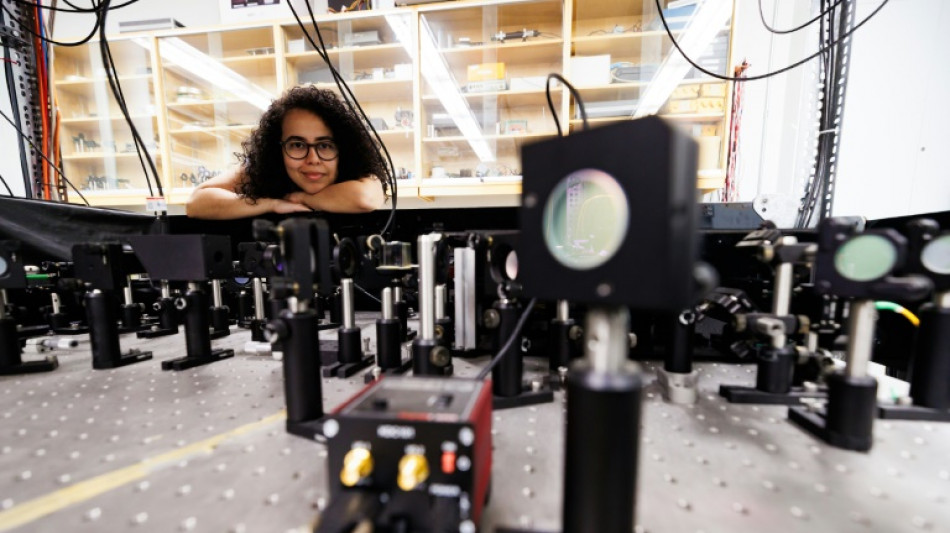
-
 Rory McIlroy wins seventh Race to Dubai title
Rory McIlroy wins seventh Race to Dubai title
-
Samsung plans $310 bn investment to power AI expansion

-
 Harmer stars as South Africa stun India in low-scoring Test
Harmer stars as South Africa stun India in low-scoring Test
-
Mitchell ton steers New Zealand to seven-run win in first Windies ODI

-
 Harmer stars as South Africa bowl out India for 93 to win Test
Harmer stars as South Africa bowl out India for 93 to win Test
-
China authorities approve arrest of ex-abbot of Shaolin Temple

-
 Clashes erupt in Mexico City anti-crime protests, injuring 120
Clashes erupt in Mexico City anti-crime protests, injuring 120
-
India, without Gill, 10-2 at lunch chasing 124 to beat S.Africa

-
 Bavuma fifty makes India chase 124 in first Test
Bavuma fifty makes India chase 124 in first Test
-
Mitchell ton lifts New Zealand to 269-7 in first Windies ODI

-
 Ex-abbot of China's Shaolin Temple arrested for embezzlement
Ex-abbot of China's Shaolin Temple arrested for embezzlement
-
Doncic scores 41 to propel Lakers to NBA win over Bucks

-
 Colombia beats New Zealand 2-1 in friendly clash
Colombia beats New Zealand 2-1 in friendly clash
-
France's Aymoz wins Skate America men's gold as Tomono falters

-
 Gambling ads target Indonesian Meta users despite ban
Gambling ads target Indonesian Meta users despite ban
-
Joe Root: England great chases elusive century in Australia

-
 England's Archer in 'happy place', Wood 'full of energy' ahead of Ashes
England's Archer in 'happy place', Wood 'full of energy' ahead of Ashes
-
Luxury houses eye India, but barriers remain

-
 Budget coffee start-up leaves bitter taste in Berlin
Budget coffee start-up leaves bitter taste in Berlin
-
Reyna, Balogun on target for USA in 2-1 win over Paraguay

-
 Japa's Miura and Kihara capture Skate America pairs gold
Japa's Miura and Kihara capture Skate America pairs gold
-
Who can qualify for 2026 World Cup in final round of European qualifiers

-
 UK to cut protections for refugees under asylum 'overhaul'
UK to cut protections for refugees under asylum 'overhaul'
-
England's Tuchel plays down records before final World Cup qualifier

-
 Depoortere double helps France hold off spirited Fiji
Depoortere double helps France hold off spirited Fiji
-
Scotland face World Cup shootout against Denmark after Greece defeat

-
 Hansen hat-trick inspires Irish to record win over Australia
Hansen hat-trick inspires Irish to record win over Australia
-
Alcaraz secures ATP Finals showdown with 'favourite' Sinner

-
 UK to cut protections for refugees under asylum 'overhaul': govt
UK to cut protections for refugees under asylum 'overhaul': govt
-
Spain, Switzerland on World Cup brink as Belgium also made to wait

-
 Sweden's Grant leads by one at LPGA Annika tournament
Sweden's Grant leads by one at LPGA Annika tournament
-
Scotland cling to hopes of automatic World Cup qualification despite Greece defeat

-
 Alcaraz secures ATP Finals showdown with great rival Sinner
Alcaraz secures ATP Finals showdown with great rival Sinner
-
England captain Itoje savours 'special' New Zealand win

-
 Wales's Evans denies Japan historic win with last-gasp penalty
Wales's Evans denies Japan historic win with last-gasp penalty
-
Zelensky renews calls for more air defence after deadly strike on Kyiv

-
 NBA's struggling Pelicans sack coach Willie Green
NBA's struggling Pelicans sack coach Willie Green
-
Petain tribute comments raise 'revisionist' storm in France

-
 Spain on World Cup brink as Belgium also made to wait
Spain on World Cup brink as Belgium also made to wait
-
Spain virtually seal World Cup qualification in Georgia romp

-
 M23, DR Congo sign new peace roadmap in Doha
M23, DR Congo sign new peace roadmap in Doha
-
Estevao, Casemiro on target for Brazil in Senegal win

-
 Ford steers England to rare win over New Zealand
Ford steers England to rare win over New Zealand
-
Massive march in Brazil marks first big UN climate protest in years

-
 Spain rescues hundreds of exotic animals from unlicensed shelter
Spain rescues hundreds of exotic animals from unlicensed shelter
-
Huge fire sparked by explosions near Argentine capital 'contained'

-
 South Africa defy early red card to beat battling Italy
South Africa defy early red card to beat battling Italy
-
Sinner beats De Minaur to reach ATP Finals title match

-
 Zelensky vows overhaul of Ukraine's scandal-hit energy firms
Zelensky vows overhaul of Ukraine's scandal-hit energy firms
-
South Africa defy early red card to beat Italy


Scientists observe 'negative time' in quantum experiments
Scientists have long known that light can sometimes appear to exit a material before entering it -- an effect dismissed as an illusion caused by how waves are distorted by matter.
Now, researchers at the University of Toronto, through innovative quantum experiments, say they have demonstrated that "negative time" isn't just a theoretical idea -- it exists in a tangible, physical sense, deserving closer scrutiny.
The findings, yet to be published in a peer-reviewed journal, have attracted both global attention and skepticism.
The researchers emphasize that these perplexing results highlight a peculiar quirk of quantum mechanics rather than a radical shift in our understanding of time.
"This is tough stuff, even for us to talk about with other physicists. We get misunderstood all the time," said Aephraim Steinberg, a University of Toronto professor specializing in experimental quantum physics.
While the term "negative time" might sound like a concept lifted from science fiction, Steinberg defends its use, hoping it will spark deeper discussions about the mysteries of quantum physics.
- Laser experiments -
Years ago, the team began exploring interactions between light and matter.
When light particles, or photons, pass through atoms, some are absorbed by the atoms and later re-emitted. This interaction changes the atoms, temporarily putting them in a higher-energy or "excited" state before they return to normal.
In research led by Daniela Angulo, the team set out to measure how long these atoms stayed in their excited state. "That time turned out to be negative," Steinberg explained -- meaning a duration less than zero.
To visualize this concept, imagine cars entering a tunnel: before the experiment, physicists recognized that while the average entry time for a thousand cars might be, for example, noon, the first cars could exit a little sooner, say 11:59 am. This result was previously dismissed as meaningless.
What Angulo and colleagues demonstrated was akin to measuring carbon monoxide levels in the tunnel after the first few cars emerged and finding that the readings had a minus sign in front of them.
- Relativity intact -
The experiments, conducted in a cluttered basement laboratory bristling with wires and aluminum-wrapped devices, took over two years to optimize. The lasers used had to be carefully calibrated to avoid distorting the results.
Still, Steinberg and Angulo are quick to clarify: no one is claiming time travel is a possibility. "We don't want to say anything traveled backward in time," Steinberg said. "That's a misinterpretation."
The explanation lies in quantum mechanics, where particles like photons behave in fuzzy, probabilistic ways rather than following strict rules.
Instead of adhering to a fixed timeline for absorption and re-emission, these interactions occur across a spectrum of possible durations -- some of which defy everyday intuition.
Critically, the researchers say, this doesn't violate Einstein's theory of special relativity, which dictates that nothing can travel faster than light. These photons carried no information, sidestepping any cosmic speed limits.
- A divisive discovery -
The concept of "negative time" has drawn both fascination and skepticism, particularly from prominent voices in the scientific community.
German theoretical physicist Sabine Hossenfelder, for one, criticized the work in a YouTube video viewed by over 250,000 people, noting, "The negative time in this experiment has nothing to do with the passage of time -- it's just a way to describe how photons travel through a medium and how their phases shift."
Angulo and Steinberg pushed back, arguing that their research addresses crucial gaps in understanding why light doesn’t always travel at a constant speed.
Steinberg acknowledged the controversy surrounding their paper's provocative headline but pointed out that no serious scientist has challenged the experimental results.
"We've made our choice about what we think is a fruitful way to describe the results," he said, adding that while practical applications remain elusive, the findings open new avenues for exploring quantum phenomena.
"I'll be honest, I don’t currently have a path from what we've been looking at toward applications," he admitted. "We're going to keep thinking about it, but I don't want to get people's hopes up."
R.Halabi--SF-PST




